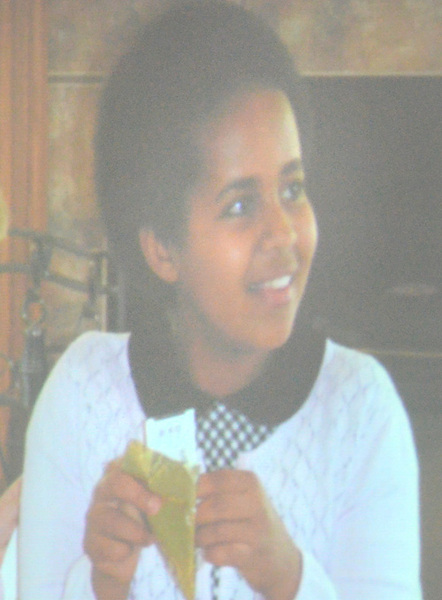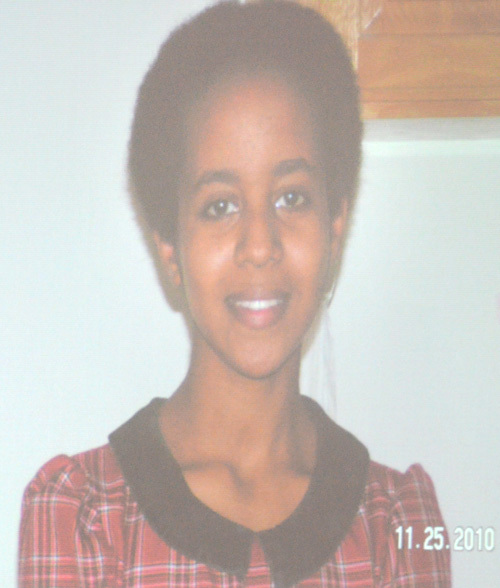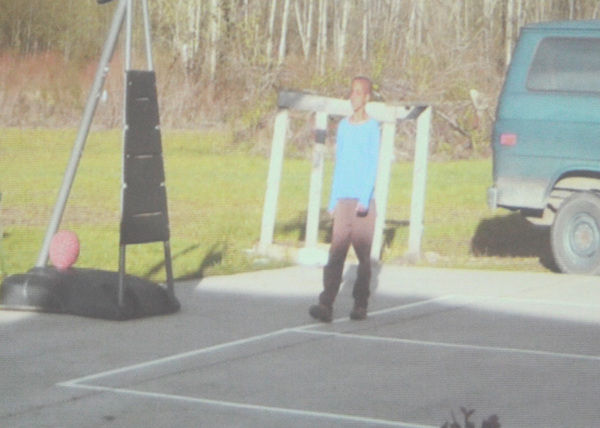Were children victims of evil or tragedy? [includes photos]



1) A photo of Hana Williams in July 2009, about a year after she was adopted, shown as evidence during Skagit County Prosecutor Rich Weyrich's closing argument.
2) A photo of Hana Williams in November 2010, shown as evidence during Skagit County Prosecutor Rich Weyrich's closing argument.
3)Evidence photo of Hana with close-cropped hair, shown to jury during Skagit County Prosecutor Rich Weyrich's closing argument.
Were children victims of evil or tragedy?Larry Williams and his lawyers listen as Skagit County Prosecutor Rich Weyrich makes the case to the jury Wednesday for the conviction of Larry and Carri Williams for the death of their adopted daughter, Hana. Scott Terrell / Skagit Valley HeraldPosted: Thursday, September 5, 2013 12:10 am
By Gina Cole
MOUNT VERNON — Victims in a “house of horrors” or children caught in a “perfect storm” that led to an accidental death. Those are the choices a jury is being asked to make in the case of a couple accused of abusing their adopted daughter to death and assaulting their adopted son.
Larry and Carri Williams tortured and starved the two children, punishing them more often and more severely than their seven biological ones for reasons they can’t explain, Skagit County Prosecutor Rich Weyrich said.
But Larry Williams was at work most of the time, including the night Hana died, Snohomish County Public Defender Rachel Forde said. Besides, she said, medical examiners and labs could have found plenty of other causes for Hana’s death, had they been more thorough.
Weyrich called the adopted Williams boy, who testified for about 12 hours in the trial, an innocent victim. Forde called him a liar.
The two lawyers offered closing arguments all day Wednesday. Carri Williams’ defense team has its turn today, and the jury could begin deliberations by week’s end.
The trial is in its seventh week, making it the longest case Weyrich said anyone in his office could remember in all his time in Skagit County.
At the start of the day, Judge Susan Cook instructed jurors on the charges they will consider, defined terms used in those laws and reminded them not to base their decisions “on sympathy, prejudice or personal preference.”
The prosecution’s caseWeyrich kicked off closing arguments by telling jurors the Williamses killed Hana in a way that “was more insidious, subtler” than a bullet to the head or a knife to the heart.
He told the jury to look at the whole picture of what two expert witnesses called torture: Hana’s parents made her use a portable toilet and shower with a hose outside, fed her cold or frozen food, hit her with a belt, glue stick or piece of plumbing line and buzzed off her hair.
When Hana died, he said, she had been spending every night locked in a closet and was under instructions that day not to speak to anyone.
Witnesses throughout the trial have recounted punishments both adopted Williams children endured that their biological siblings did not. But few could recall specific examples of why they got them, instead simply referencing “rebellion” or “oppositionality,” he said.
Weyrich asked the jury to weigh the credibility of various witnesses, including the Williamses themselves, who he said seemed to remember the answers to their own lawyers’ questions but not to prosecutors’.
Hana was “intentionally starved” by people who said they didn’t realize she was wasting away, Weyrich argued. Medical records show Hana weighed about the same amount when she died as when she first arrived from Ethiopia three years before.
One of the elements of the homicide by abuse charge is an “extreme indifference to human life.”
The night she died, Hana had been repeatedly falling down, bloodying her knees and bumping her head on the concrete. Carri Williams testified she couldn’t bear to watch and went inside, assuming Hana was doing it on purpose.
“Whether she’s faking it or not, what could better define extreme indifference than a mother walking along watching her daughter hurt herself?” Weyrich said. “… That blow to the head didn’t cause the death, although it darn well should have caused some concern.”
When Hana began undressing, a sign of hypothermia, Carri Williams told the son she’d asked to help her bring Hana inside to “forget it.” When she later found Hana face-down in the dirt and unresponsive, she covered the naked girl with a sheet before having sons help carry her in.
“Carri Williams was too worried about modesty to bring her child in to save her life,” Weyrich said Wednesday.
Weyrich said Larry Williams, who pinned much of the blame on his wife, was “long on downplaying his involvement but very short on the details.”
“They both played an integral part in this little house of horrors,” he said.
Weyrich reminded the jury of the adopted boy’s post-traumatic stress disorder diagnosis, constant apologizing and descriptions of fear in the therapy sessions he has had since leaving the Williams home.
All the discipline the adopted children got was for behavioral problems, the Williamses testified. But the couple never used resources available to them through the adoption agency to address those problems, he said.
Instead, the children were isolated, with no contact with an Ethiopian community, few friends and no activities outside the family, he said. The Williamses made sure everything appeared fine from the outside, he said.
“They didn’t want the world to know what was going on on Erna Lane,” Weyrich said. “(The adopted children) can’t run away because they don’t know where to go. They can’t call anyone for help because they don’t know anyone, or know who to call for help. They must stay and endure.”
Larry Williams’ case
Forde began her closing argument by acting out her client driving home from a long shift at work the night Hana died, talking through an inner monologue questioning his wife’s discipline tactics.
“You are not here to judge whether or not Larry Williams was a good parent,” she said. Jurors must apply the law, she said, not a “gut check.”
Forde laid out each element of each charge, saying all the jury needs is “an alternate explanation that is not completely preposterous” to find Larry Williams not guilty.
Hana’s stomach infection, an eating disorder, poisoning or a diabetic crisis also could explain her death, Forde argued. A lab was unable to test fluid from Hana’s eyes that could have pointed to some other cause, she said.
“Had that vitreous fluid been tested, ladies and gentlemen, you might not even be here,” she said. “And certainly you cannot convict Mr. Williams of homicide because a lab couldn’t do a test.”
Even if the autopsy findings are correct, Larry Williams is not to blame, Forde said. Hypothermia is an acute condition, and he wasn’t there when his daughter came down with it, she said.
If Hana was starving, as a doctor testified for the prosecution, she would have eaten the frozen food and wet sandwiches her parents fed her, Forde said.
“These children were not starving,” she said. “… There are too many things that don’t add up.”
Hana looks thin in autopsy photos, but hindsight is clearer than seeing someone in the moment, Forde said. Larry Williams only ever saw his daughter modestly dressed and couldn’t have noticed any bones but her collarbone sticking out, she said.
“Every celebrity in every People magazine has protruding collarbones,” she said. “That does not mean they’re about to keel over and die.”
Forde called the adopted son a “self-professed liar” and said he contradicted himself.
“He’s a troubled kid. He’s had to endure things that are not his fault,” she said. “But just because you feel sorry for him, you should not take his testimony at face value.”
No experts said definitively that Hana was younger than 16 when she died, Forde pointed out. The homicide by abuse charge applies only for victims younger than 16, she said.
Homicide by abuse and assault of a child both require the defendants to have inflicted more than temporary marks and transient pain. Any marks the Williamses allegedly left on their children are gone now, Forde said.
Forde described discipline in the Williams home as an iceberg, saying Larry Williams could not be a perpetrator or even an accomplice because he saw only the tip.
“The evidence is overwhelming that Carri Williams designed, planned and implemented this entire program, no matter what she said on the stand last week,” Forde said.
Even so, Forde said, Hana was really just a victim of circumstance: children from difficult beginnings, struggling with adolescence in an unfamiliar country, adopted by naive parents who thought they could discipline them into obedience.
Forde called it a “perfect storm” that eventually, and accidentally, killed Hana.
The charges
Larry and Carri Williams are charged with homicide by abuse and first-degree manslaughter in the death of Hana Williams, who collapsed in the family’s backyard one rainy night in May 2011. An autopsy showed she died of hypothermia hastened by malnutrition and a stomach condition.
The pair also is charged with first-degree assault of the younger boy they adopted from Ethiopia at the same time as Hana.
The jury also can consider certain lesser charges.
— Reporter Gina Cole: 360-416-2148, gcole@skagitpublishing.com, Twitter: @Gina_SVH, facebook.com/byGinaCole